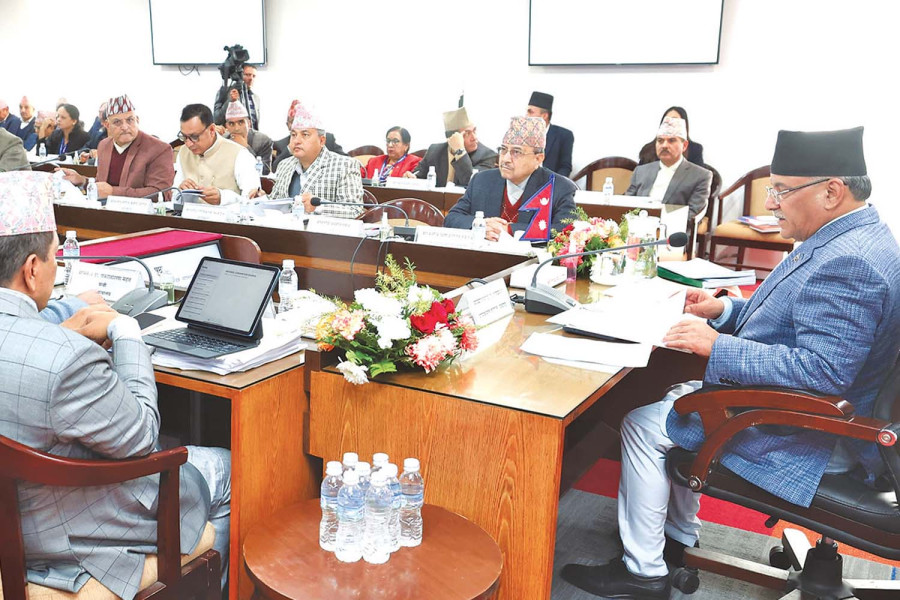National
Federal government buys time to set up provincial police, devolve powers
Local units want significant shares of radio frequency royalty, taxes raised from natural resources, and other rights.
Binod Ghimire
The National Coordination Council meeting ended indecisively on Wednesday after the federal government sought until April to address the demands of subnational governments.
Led by the prime minister, the 20-member council is responsible for coordinating among the three tiers of government in law and policy formation on the issues of power devolution. Ministers for home affairs, finance, law and justice and general administration and federal affairs from Singha Durbar, provincial chief ministers, the leader of the opposition, and representatives from local governments are among the members of the council.
Prime Minister Pushpa Kamal Dahal had called the council’s meeting for Wednesday amid the pressure from provincial governments to immediately adjust Nepal Police units to provincial police forces and promulgate the Federal Civil Service Act. Besides, the local governments have been demanding a bigger pie of the revenue collected from excise duty and revenue from the use of natural resources.
“The meeting was a platform where we presented our concerns and listened to the federal government,” Saroj Yadav, chief minister of Madhesh, told the Post. “The prime minister and federal ministers have assured that all the groundworks to address our issues will be completed by the end of Falgun (mid-March) and the council’s meeting will be called by Chaitra (mid-April) to make a formal decision.”
Yadav said they were expecting some progress in implementing issues that the council had agreed on earlier. The meeting held in Pokhara on July 1 had agreed to clarify the jurisdiction of the three tiers of government within six months. Curbing duplication of works among the different tiers of government, transferring the chief administrator only after two years, ensuring the participation of local and provincial representatives while formulating federal laws and setting the revenue distribution proportion were other issues that were to be implemented by the end of 2023.
The meeting chaired by Dahal also had agreed to adjust Nepal Police at the federal level and to promulgate the federal civil service and federal education laws without delay. However, most of the issues still remain unimplemented.
Yadav said the prime minister and other ministers had claimed that they were seriously working on police readjustment and enactment of the laws needed for full-fledged implementation of federalism. The provincial governments have been demanding the federal government restructure the police force and promulgate necessary laws. Despite reiterated commitments, neither the police force has been adjusted at the provincial level nor has the federal government prepared the federal civil service bill.
In a statement issued after the meeting, the council secretariat said the achievements and problems in implementing federalism and the reasons behind the delays in enacting crucial laws were discussed. “Preparing federal laws is the government’s responsibility. Once provincial governments start serving people effectively, those opposing federalism will be shut up, the statement quoted Dahal as saying.
Similarly, Deputy Prime Minister and Minister for Home Affairs Narayan Kaji Shrestha reiterated that he was working to ensure the police force is reorganised as soon as possible. “Police adjustment process has moved ahead. We will complete it soon,” the statement quoted him as saying. Shrestha also said while the adjustment process continues, amendments to the Police Personnel Adjustment Act and the Act to Govern the Operation, Supervision and Coordination of Nepal Police and Provincial Police Forces endorsed in 2019 will be registered in Parliament before the next council’s meeting. The revision in law is necessary to bring the security oversight of Kathmandu Valley under the Bagmati Province’s jurisdiction as demanded by provincial governments.
The local federal units also had presented their demands before the council’s meeting on Wednesday. They want significant shares of the radio frequency royalty distribution, royalty raised from natural resources, and increments in supplementary and special allowances, among others. Currently, the federal government uses 70 percent of the total money collected in the forms of Value Added Tax and Excise Duty. The provinces and local units get just 15 percent of the share each. They want it to be increased to 25 percent each.
They also drew the federal government’s attention to the fact that 150 local units have been left without chief administrative officers.
“We raised our issues. Now we have no option but to wait until Chaitra,” Bhim Prasad Dhungana, president of the Municipal Association of Nepal, told the Post. The representatives of the rural governments say they believe that the federal government doesn't push the deadline.
“We are hopeful that some concrete decisions will be made the next day. We believe in our prime minister,” Laxmi Devi Pande, chairperson of the National Association of Rural Municipalities in Nepal, told the Post.




 18.12°C Kathmandu
18.12°C Kathmandu














